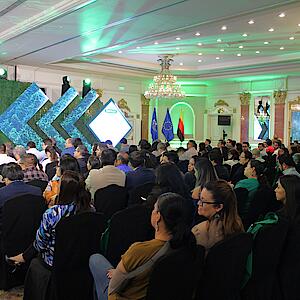Neutralbank: new technological system implemented by CABEI to measure greenhouse gas emissions in its operations

The tool, approved by multilateral banking standards, facilitates the measurement of greenhouse gases (GHG) in order to mitigate environmental impacts and transparency of information.
Tegucigalpa, December 7th 2022. - As part of the transformation process and the modernization of its management, the Central American Bank for Economic Integration (CABEI) became in 2022 the first regional organization to implement a system for measuring greenhouse gas (GHG) emissions in the operations it finances, implementing its new "Neutralbank" tool, which complies with international multilateral banking standards.
This is a complementary solution to the Environmental and Social Risk Identification, Evaluation and Mitigation System (SIEMAS) and the Development Impact Evaluation System (SEID) that the bank applies in its operations. This tool will measure in two ways: on the one hand, the absolute emissions that can be generated by operations and, on the other hand, the emissions that can be avoided as a contribution to mitigation by making calculations based on reference situations, comparing the balance between the emissions produced prior to the execution of a project and after its implementation.
"In recent years we have taken great strides to strengthen our contribution to sustainable and equitable development in the region, and we are now moving forward with concrete actions to make the data easily measurable, transparent and congruent with the global indicators that determine the regional and member country agendas," said CABEI Executive President, Dr. Dante Mossi, who recalled that CABEI incorporated environmental and social sustainability as a cross-cutting axis in its Institutional Strategy 2020-2024 - Pillar of Sustainable Development in the Region, thus prioritizing operations that favor environmental and social sustainability in the region. Dante Mossi, who recalled that the Bank incorporated environmental and social sustainability as a transversal axis in its 2020-2024 Institutional Strategy - Pillar of Sustainable Development in the Region, thus prioritizing operations that favor social development and environmental preservation.
A tool for transparency
The Neutralbank is an approved and robust mechanism. It was developed in a record time of five months, using the methodology and best practices of the Carbon Footprint Tool for Projects of the French Development Agency (AFD), in support of CABEI's capacity building and, through CABEI's Social and Environmental Monitoring Office, an intense training, testing and validation process was carried out under unequivocal management, traceability and scalability conditions.
In a first phase, 16 productive sectors were incorporated, among them those related to renewable energies and natural gas production and transportation; and work is being done on the registration and traceability of operations that contribute to mitigation, .
In the coming months, another 15 sectors will be added and post-production support will continue and the scope will be expanded according to the needs arising from domestic demand and international information requirements, reaffirming CABEI's commitment to the Glasgow Pact, agreed by the United Nations Framework Convention on Climate Change at COP26, to support climate change adaptation and mitigation actions in its member countries.
"We have had great achievements in the strategic alignment for the promotion of climate change investments, but we needed a tool adapted to the CABEI context that would allow the measurement of avoided GHG emissions in observance of international standards," explained the Head of CABEI’s Social and Environmental Monitoring Office, Julio Cárcamo.
Through the implementation of this new initiative, CABEI contributes to the fulfillment of the goals of Sustainable Development Goal 13 "Climate Action" by providing interactive information of interest to different internal and external users. The information reports will be prepared on an annual basis and will be standardized according to multilateral development bank standards.


![[Translate to English:] [Translate to English:]](/fileadmin/_processed_/a/d/csm_2022-11-21_CABEIBusinessForum2022-0054_b7c51952bf.jpg)


![[Translate to English:] [Translate to English:]](/fileadmin/_processed_/e/3/csm_WhatsApp_Image_2024-04-18_at_2.12.23_PM__2__590ef43ade.jpeg)
